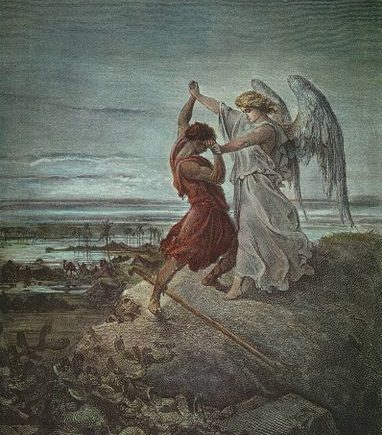by Lois Tverberg
So Jacob said to Pharaoh, ‘The years of my sojourning are one hundred and thirty; few and unpleasant have been the years of my life, nor have they attained the years that my fathers lived during the days of their sojourning.’
– Genesis 47:9
Many people struggle with the idea that God would work out his plans to establish a nation through the deceitful actions of Jacob. Jacob used a weak moment to barter his brother Esau’s birthright away from him, and he deceived his father into giving him his brother’s blessing. Did God bless his unethical behavior?
Interestingly, his life story shows that his scheming often came back to haunt him. It is most obvious in one case – he used his father’s blindness to substitute himself for his brother, to steal his blessing; but he also was deceived by “blindness” too when on his wedding night, Leah was substituted for her sister Rachel. This is called “measure for measure” by the rabbis – that because he used blindness to deceive, God let him be deceived in the same way.
 Throughout Jacob’s life, we see that although God is fulfilling his promise to him to give him a family, Jacob does not have the peace that his father and grandfather did. He had to leave his home for fear that his angry brother would kill him and work many years for his crafty uncle. He lost his beloved wife Rachel at a young age and believed that he had lost his favorite son Joseph for many years too. Even Jacob’s suffering over Joseph was brought on by his sons’ terrible jealousy because of his obvious favoritism toward Joseph.
Throughout Jacob’s life, we see that although God is fulfilling his promise to him to give him a family, Jacob does not have the peace that his father and grandfather did. He had to leave his home for fear that his angry brother would kill him and work many years for his crafty uncle. He lost his beloved wife Rachel at a young age and believed that he had lost his favorite son Joseph for many years too. Even Jacob’s suffering over Joseph was brought on by his sons’ terrible jealousy because of his obvious favoritism toward Joseph.
While Abraham “died at a good, ripe age, old and contented” (Gen. 25:8), and Isaac also died at “a ripe old age” (Gen. 35:29), that is not said about Jacob. Instead, Jacob told Pharoah that the years of his life had been “few and unpleasant” (Gen. 47:9). From the time that he deceived his father until the end of his days, his life had been full of trials, many of them brought on himself.
We can learn a lesson through this – that God is faithful and merciful to us who are under his blessing, but he usually refrains from sparing us from the earthly consequences of our sins. We should live wisely knowing that although we are under God’s forgiveness, how we act toward others will have a large impact on the way our lives play out.
*This article was based on an essay in “Understanding Genesis”, by Nahum Sarna, Shocken Books 1966, p. 183.
Photocred: http://www.ibiblio.org/wm/paint/auth/dore/



